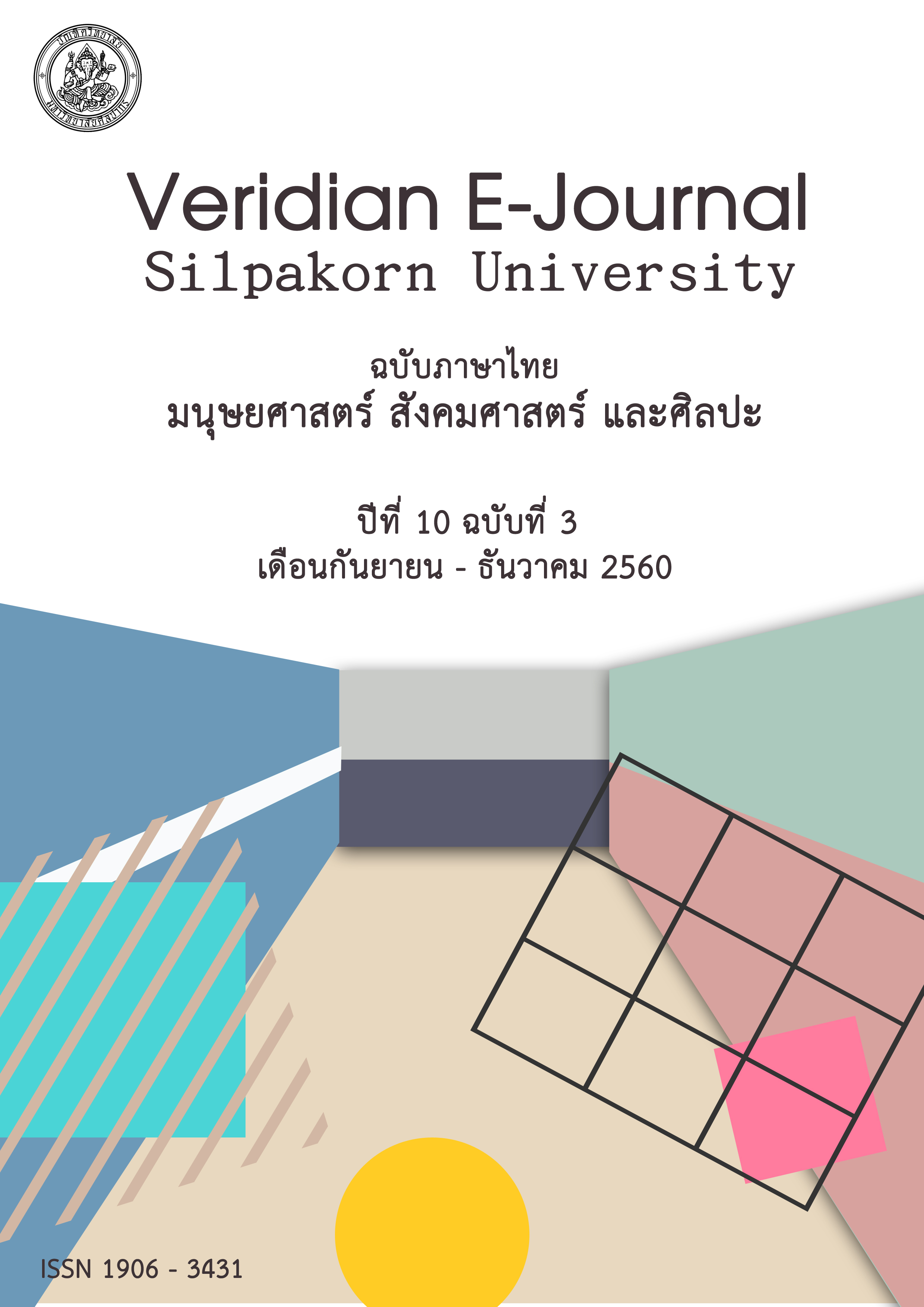การพัฒนากระบวนการเรียนรู้เพื่อเสริมสร้างจิตสำนึกรักษ์น้ำอย่างยั่งยืนโดยใช้กระบวนการสร้างนิสัยเป็นฐาน ของเยาวชนคนกลางน้ำคลองท่าแนะ จังหวัดพัทลุง
Main Article Content
Abstract
งานวิจัยนี้มีวัตถุประสงค์เพื่อ 1) พัฒนากระบวนการเรียนรู้เพื่อเสริมสร้างจิตสำนึกรักษ์น้ำอย่างยั่งยืนโดยใช้กระบวนการสร้างนิสัยเป็นฐานของเยาวชนคนกลางน้ำคลองท่าแนะ จังหวัดพัทลุง 2) เสริมสร้างจิตสำนึกรักษ์น้ำโดยใช้กระบวนการสร้างนิสัยเป็นฐานของเยาวชนคนกลางน้ำคลองท่าแนะ จังหวัดพัทลุง และ 3) ศึกษาความคงทนของจิตสำนึกรักษ์น้ำโดยใช้กระบวนการสร้างนิสัยเป็นฐานของเยาวชนคนกลางน้ำคลองท่าแนะ จังหวัดพัทลุง กลุ่มตัวอย่างที่ใช้ในการวิจัยได้แก่ นักเรียนเยาวชนจำนวน 60 คน ครูจำนวน 6 คน และตัวแทนชุมชนจากที่ตั้งของสถานศึกษาจำนวน 3 คน จากสถานศึกษากลางน้ำ 3 โรงเรียน ได้แก่ โรงเรียนวัดรังแคบ โรงเรียนวัดไทรโกบ และโรงเรียนวัดพิกุลทองที่ได้จากการเลือกแบบมีวัตถุประสงค์ (purposive sampling) เครื่องมือที่ใช้ในการวิจัยได้แก่ 1.แผนการจัดกระบวนการเรียนรู้เพื่อเสริมสร้างจิตสำนึกรักษ์น้ำอย่างยั่งยืนโดยใช้กระบวนการสร้างนิสัยเป็นฐานของเยาวชนคนกลางน้ำคลองท่าแนะ จังหวัดพัทลุง 2.แบบประเมินรับรองกระบวนการเรียนรู้เพื่อเสริมสร้างจิตสำนึกรักษ์น้ำอย่างยั่งยืนโดยใช้กระบวนการสร้างนิสัยเป็นฐานของเยาวชนคนกลางน้ำคลองท่าแนะ จังหวัดพัทลุง 3.แบบประเมินจิตสำนึกรักษ์น้ำตามแนวคิดการประเมิน 360 องศาของเสาวรส ยิ่งวรรณะ (2559) จำนวน 4 ฉบับ ประกอบด้วย 1)แบบประเมินสำหรับนักเรียน 2)แบบประเมินสำหรับเพื่อน 3)แบบประเมินสำหรับครู และ 4)แบบประเมินสำหรับผู้ปกครอง สถิติที่ใช้ในการวิจัย ได้แก่ ร้อยละ ค่าเฉลี่ย ส่วนเบี่ยงเบนมาตรฐาน และการทดสอบความแตกต่างระหว่างค่าเฉลี่ยที่กลุ่มตัวอย่างสัมพันธ์กัน (dependent t-test.)
ผลการวิจัย พบว่า
1) กระบวนการเรียนรู้เพื่อเสริมสร้างจิตสำนึกรักษ์น้ำอย่างยั่งยืนโดยใช้กระบวนการสร้างนิสัยเป็นฐานของเยาวชนคนกลางน้ำคลองท่าแนะ จังหวัดพัทลุง ได้รับการพิจารณาคุณภาพจากผู้เชี่ยวชาญคุณภาพด้านความถูกต้องชัดเจนอยู่ในระดับมากที่สุด (=4.53, SD.=0.53) คุณภาพด้านความความเหมาะสมอยู่ในระดับมากที่สุด (=4.51, SD.=0.58) และคุณภาพด้านความง่ายต่อการนำไปใช้อยู่ในระดับมากที่สุด (=4.57, SD.=0.55) ประกอบด้วย (1) การสร้างวิสัยทัศน์ร่วมกัน (2) กำหนดเป้าหมายร่วมกัน (3) พัฒนาครูเพื่อสร้างแผนกิจกรร (4) แผนการจัดกระบวนการเรียนรู้ (5) ร่วมปฏิบัติตามแผน (6) แลกเปลี่ยนเรียนรู้และประเมินผล
และ (7) การนำเสนอผลและวางแผนการปรับปรุงพัฒนาส่วนแผนการจัดกระบวนการเรียนรู้ประกอบไปด้วย (1) สาระการเรียนรู้ (2) เวลา (3) ผลการเรียนรู้ที่คาดหวัง (4) กระบวนการเรียนรู้ (5) สื่อและแหล่งการเรียนรู้ (6) การประเมินประจำแผน และ (7) แผนการพัฒนาหากไม่เป็นไปตามผลการเรียนรู้ที่คาดหวัง
2) การเปรียบเทียบระดับจิตสำนึกรักษ์น้ำของนักเรียนระยะก่อนและระยะหลังการเข้าร่วมโครงการวิจัยที่ได้จากผู้ประเมินแต่ละแหล่ง พบว่า โดยรวมคะแนนจิตสำนึกรักษ์น้ำของนักเรียนเยาวชนหลังการเข้าร่วมกิจกรรมสูงกว่าก่อนเข้าร่วมกิจกรรม โดยโรงเรียนวัดหรังแคบ นักเรียนประเมินจิตสำนึกรักษ์น้ำของตนเอง ครูและผู้ปกครองประเมินจิตสำนึกรักษ์น้ำของนักเรียนแตกต่างกันอย่างมีนัยสำคัญทางสถิติที่ระดับ .05 โรงเรียนวัดไทรโกบ นักเรียนประเมินจิตสำนึกรักษ์น้ำของตนเอง ครูและผู้ปกครองประเมินจิตสำนึกรักษ์น้ำของนักเรียนแตกต่างกันอย่างมีนัยสำคัญทางสถิติที่ระดับ .05 โรงเรียนวัดพิกุลทอง พบว่าผู้ประเมินจากทุกแหล่งประเมินจิตสำนึกรักษ์น้ำของนักเรียนแตกต่างกันอย่างมีนัยสำคัญทางสถิติที่ระดับ .05
3) การศึกษาความคงทนของจิตสำนึกรักษ์น้ำโดยใช้กระบวนการสร้างนิสัยเป็นฐานของเยาวชนคนกลางน้ำคลองท่าแนะ จังหวัดพัทลุง โดยการเปรียบเทียบระดับจิตสำนึกรักษ์น้ำของนักเรียนระยะหลังและระยะติดตามผลหลังการเข้าร่วมโครงการวิจัย ที่ได้จากการประเมินของผู้ประเมินแต่ละแหล่ง พบว่า โรงเรียนวัดหรังแคบ ผู้ประเมินจากทุกแหล่งประเมินจิตสำนึกรักษ์น้ำของนักเรียนแตกต่างกันอย่างมีนัยสำคัญทางสถิติที่ระดับ .05 โรงเรียนวัดไทรโกบ นักเรียนประเมินจิตสำนึกรักษ์น้ำของตนเอง ครูและผู้ปกครองประเมินจิตสำนึกรักษ์น้ำของนักเรียนแตกต่างกันอย่างมีนัยสำคัญทางสถิติที่ระดับ .05 โรงเรียนวัดพิกุลทอง นักเรียนประเมินจิตสำนึกรักษ์น้ำของตนเอง ครูและเพื่อนประเมินจิตสำนึกรักษ์น้ำของนักเรียนแตกต่างกันอย่างมีนัยสำคัญทางสถิติที่ระดับ .05
The purposes of this study were as follows: (1) to develop of a learning process for sustainable enhancing water conservation consciousness through habit formation process of basin community youths of Kon Klang Nam Khlong Ta Nae, Phatthalung province. 2) to enhance water conservation consciousness through habit formation process of basin community youths’ Kon Klang Nam Khlong Ta Nae, Phatthalung province, 3) to study sustainability of enhancing water conservation consciousness through habit formation process of basin community youths of Kon Klang Nam Khlong Ta Nae, Phatthalung province. The samples of this study were 60 students, 6 teachers and 3 community representatives of 3 schools in Klang Nam basin community : Wat Sai kop School, Wat lang Kab School and Wat Pikun Thong School using purposive sampling method. The research instruments were 1) learning process for sustainable enhancing water conservation consciousness through habit formation process of basin community youths of Kon Klang Nam Khlong Ta Nae, Phattalung province 2) assessment form to affirm the learning process for sustainable enhancing water conservation consciousness through habit formation process of basin community youths of Kon Klang Nam Khlong Ta Nae, Phattalung province were approved by experts in terms of appropriateness, possibility and ease for implementation at the most qualified level. 3) the assessment of the water conservation consciousness with 360 degree appraisal from Saowarot Yinwanna (2016) of components: the assessment for students, friends, teachers and parents. The data use of and statistical analysis, were percentage, mean, standard deviation and dependent t-test.
The results were as follows:
1) The learning process for sustainable enhancing water conservation consciousness through habit formation process of basin community youths of Kon Klang Nam Khlong Ta Nae, Phattalung province were approved by experts in terms of accuracy (=4.53, SD.=0.53), appropriateness (=4.51, SD.=0.58)and ease for implementation (=4.57, SD.=0.55. All the most qualified. There are seven components in this learning process: (1) mutual creation of vision (2) mutual determination of goal setting (3) teacher ability development of creating activity plans (4) plan of learning process (5) mutual following plan (6) learning exchange and evaluation (7) result presentation and improvement. Plans of learning process consist of 1) learning standards 2) time 3) expected learning outcomes 4) learning process 5) materials and learning resources 6) evaluation of individual plan 7) plan improvement if the results were not as expected. 2) The comparisons of the results of students' level of consciousness enhancing water before and after participating the research project of through habit formation process of basin community youths of KonKlang Nam Khlong Ta Nae, Phattalung province gathering from evaluators of each information source found that consciousness of student evaluation of themselves, teachers and parents at Wat Lang Kab School, Wat Sai Kop School and Wat Pikun Thong School were statistically significantly different at .05. 3) The comparisons of the results of students' level of consciousness enhancing water after participating the research project of through habit formation process of basin community youths of Kon Klang Nam Khlong Ta Nae, Phattalung province and follow-up gathering from evaluators of each information source found that the consciousness of student evaluation of themselves, teachers and parents at Wat Sai Kop School was statistically significantly different at .05. The consciousness of student evaluation of themselves, teachers, parents and friends at Wat Lang Kab was statisticallysignificantly different at .05 whereas at Wat Pikun Thong the consciousness of student evaluation of themselves, teachers and friends regardless of parents was statistically significantly different at .05

